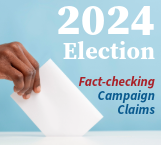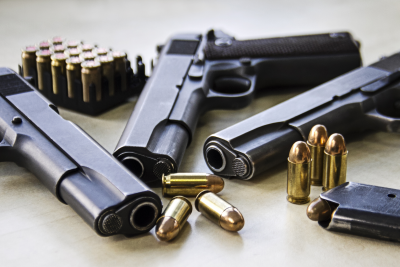Este artículo estará disponible en español en El Tiempo Latino.
Gun rights candidates often falsely exaggerate their opponent’s position, claiming they want to confiscate weapons from law-abiding citizens. Mark R. Joslyn, professor of political science at the University of Kansas, says this is one of the reasons why gun owners generally vote more reliably than non-gun owners.

In a speech at a National Rifle Association convention on May 18, former President Donald Trump employed that very tactic, deceptively stoking fears that if President Joe Biden is reelected, the government will be “coming for your guns.” Biden has advocated a ban on so-called assault weapons, but he has not proposed confiscating ones currently owned. Trump followed it up by claiming that gun owners don’t vote as often as non-gun owners. That’s wrong.
In his 2020 book, “The Gun Gap: The influence of gun ownership on political behavior and attitudes,” Joslyn analyzed two public databases that have tracked American attitudes for decades to conclude that gun owners are more likely to vote compared with non-owners, that the gap is widening, and that the more guns one owns the more likely one is to vote.
That runs directly counter to Trump’s narrative at the NRA convention.
Trump, May 18: But one thing I’ll say, and I say it as friends, we’ve got to get gun owners to vote because you know what? I don’t know what it is — perhaps it’s a form of rebellion because you’re rebellious people, aren’t you? — but gun owners don’t vote. What is that all about? I’ve heard that. I heard it a few weeks ago. If the gun owners voted, we would swamp them at levels that nobody’s ever seen before. So I think you’re a rebellious bunch, but let’s be rebellious and vote this time. Okay?
Later in the speech, Trump reiterated the point: “And remember what I told you is so true. The gun owners don’t vote. It’s so crazy. They should be … I would think that they would vote more than any other group of people. And it’s just the opposite. They don’t vote. And they have to get out and vote.”
We reached out to the Trump campaign for backup for his claim but did not get a response.
Trump’s claim is “false,” Joslyn told us via email. “Gun owners, compared to non-gun owners, tend to vote more, not less. In addition, political participation (including voting) increases with the number of guns owned.”
Joslyn’s conclusion is based on an analysis of two databases: the General Social Survey, a comprehensive examination of American attitudes and beliefs, conducted since its creation in 1972 by the National Opinion Research Center at the University of Chicago, and the American National Election Studies, a collaboration of Stanford University, the University of Michigan, Duke and the University of Texas at Austin that has tracked public attitudes about elections for decades.

The GSS survey showed that gun owners consistently reported voting in national elections at a higher rate than non-gun owners in elections from the mid-1970s through 2016.
“Since 1996, the gap between gun owners’ and nonowners’ reported vote is about 11 percent,” Joslyn wrote in his book, which covers federal elections up to 2016. “Turnout among gun owners has increased since 1972 and peaked in 2004 and 2008 at 79 percent. In contrast, turnout declined among nonowners from a high in 1972 of 70 percent to a low of 64 percent in 1996 and 2016.”
Joslyn attempted to tease out the effect of other variables that might explain the disparity in voting behavior, other than gun ownership.
“For example, older people vote more than younger people, and gun ownership and age are positively associated,” Joslyn wrote. “Similarly, higher-income groups are more likely to vote, and income also predicts gun ownership. Race plays a role as well: Whites are more likely to own guns and participate in politics than Blacks. Education is yet another strong predictor of turnout, as is church attendance.”
Parsing those variables, Joslyn found that gun ownership had a “statistically significant effect,” albeit a modest one.
“In summary, results show that gun ownership is a significant predictor” of whether someone votes, Joslyn wrote. “It survives a multivariate test that includes strong correlates of political participation.”
Joslyn also considered that reported voting is usually higher than actual voting — in other words, people sometimes say on surveys they have voted when they really didn’t — though “there is no reason to believe that gun owners are more likely than nonowners to misreport turnout,” he said. Joslyn compared the reported levels of voting to the validated votes of gun owners and non-owners for the 2012 and 2016 presidential contests and the 2014 congressional races, as tracked by the ANES. (In ANES’ voter validation studies, “field interviewers go to local election offices and look at the office’s record of participation for each respondent.”)
While the validated vote was lower than the reported vote, Joslyn wrote, ANES similarly found that “gun owners’ validated turnout levels are higher [than for non-gun owners] and group differences remain significant. Again, this finding demonstrates the political influence of gun ownership on political behavior. A gun, of course, symbolizes many things, but in this case, it indicates Election Day participation and a willingness to affect electoral outcomes.”
Joslyn did not analyze the validated voting figures from ANES for the 2020 election, but he did analyze for us the 2020 self-reported vote, which again showed gun owners were more likely to vote — 80% of gun owners self-reported that they had voted in 2020, as opposed to 73% of non-gun owners.
“Controlling for other relevant predictors including gender, age, education, income, church attendance, and race,” gun ownership was a predictor of voter participation in 2020 — meaning “gun owners compared to non-gun owners are more likely to report voting in 2020,” Joslyn told us.
“[T]he empirical evidence … represent a strong case for gun owners as an important political group in American politics,” Joslyn wrote in “The Gun Gap.” “Gun owners represent a large group. They exhibit a distinctive vote choice and reliably show up on Election Day. As a group, they also actively engage gun organizations and politicians on gun policy. There is variation within the group. The stronger a member’s attachment to guns, the more likely he or she is to vote, and to vote for a Republican.”
Joslyn cited a number of possible reasons why gun owners vote at higher levels. According to his book:
- “Their personal and group interests are often implicated in debates about gun access and use. This naturally draws their attention. A personal stake in politics is clear.
- “Gun rights organizations are quick to exploit threats to owners’ interests and use them as powerful incentives to engage. The National Rifle Association (NRA) and other advocates are experienced in election politics and successful in mobilizing gun interests.
- “Local and state gun rights organizations are plentiful and well positioned to support turnout efforts and effectively reach gun enthusiasts and other supportive citizens.”
“The NRA recognizes gun owners’ voting calculus and repeatedly stirs the pot,” Joslyn wrote. “It arouses suspicion, raises doubts, and prompts gun owners to consider an adverse reality where guns could be confiscated and the Second Amendment challenged.”
Trump did just that in his speech at the NRA convention.
Trump, May 18: If the Biden regime gets four more years, they are coming for your guns, 100% certain. Crooked Joe has a 40-year record of trying to rip firearms out of the hands of law-abiding citizens. He’s always wanted to do that.
That’s a distortion of Biden’s position, as we have written several times over the years.
Biden’s Position on Gun Control
Biden has long sought to ban the manufacture and sale of so-called assault weapons and high-capacity magazines for ammunition. But he has not proposed confiscating such weapons. Rather, he has advocated a mandatory federal registry and a voluntary buyback program for all legally purchased assault weapons.
On the campaign trail, Biden often likes to tout that he signed “the first major gun legislation in over 30 years.” He’s referring to the Bipartisan Safer Communities Act, a compromise bill that became law in June 2022 and provided $750 million for states to implement “crisis intervention court proceedings and related programs or initiatives, including but not limited to mental health courts; drug courts; veterans courts; and extreme risk protection order programs.” That last bit refers to so-called red flag laws to temporarily remove firearms from people deemed to be a danger to themselves or others. The law also extended the prohibition of guns for people convicted of domestic abuse to include dating partners, and it expanded background checks on gun purchasers between the ages of 18 and 21.
In September, Biden also created the White House Office of Gun Violence Prevention, and his administration has sought to — among other things — crack down on rogue gun dealers and reduce the number of guns sold without background checks. But, Biden said recently, “I think we have to do more.”
Biden said he supports national red flag laws, required safe storage of weapons and required background checks for all gun purchases.
But nothing in Biden’s record suggests Biden is “coming for your guns” and would seek to “rip firearms out of the hands of law-abiding citizens.” Biden, who often notes that he himself owns guns, repeatedly has said he does not favor banning all guns, as he made clear in a colorful exchange with an autoworker during the presidential campaign in March 2020:
Man, March 20, 2020: You are actively trying to end our Second Amendment right and take away our guns.
Biden: You’re full of shit. I did not—no, no, shush. Shush. I support the Second Amendment. The Second Amendment — just like right now if you yelled fire, that’s not free speech. And from the very beginning, I have a shotgun, I have a 20-gauge, a 12-gauge. My sons hunt, guess what? You’re not allowed to own any weapon, I’m not taking your gun away at all. You need 100 rounds?
Man: You and [former Rep.] Beto [O’Rourke] say you’re going to take our guns —
Biden: I did not say that. That’s not true. I did not say that.
Rather, Biden explained his position in Las Vegas in December, saying, “We need to ban assault weapons and high-capacity magazines; pass national red flag laws … require safe storage; enact universal background checks and other commonsense measures to save lives. Because, you know, the Second Amendment didn’t say you can own any gun, you can own any weapon.”
In other words, Biden says he would seek to limit the manufacture and sale of certain guns, and he would prohibit the sale of guns to people deemed to have dangerous mental health issues. But he has never proposed confiscating guns from law-abiding citizens.
Editor’s note: FactCheck.org does not accept advertising. We rely on grants and individual donations from people like you. Please consider a donation. Credit card donations may be made through our “Donate” page. If you prefer to give by check, send to: FactCheck.org, Annenberg Public Policy Center, 202 S. 36th St., Philadelphia, PA 19104.